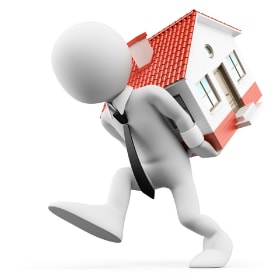Get a Home Insurance quote now. Start saving.

Don’t panic if you don’t have the cash on hand because lenders are prepared to help you – for a price, of course.
What is a Cash Back Mortgage?
Many Canadian banks and other lenders are offering cash back mortgages. After you put out your own money for the down payment, the banks will return a percentage of your mortgage principal in a lump sum when your mortgage closes.
But you have to consider why the banks are so willing to put money in your pocket. By giving you cash, they take away your opportunity to negotiate. If you decide to get a cash back mortgage, you’ll find yourself paying a decidedly higher interest rate than on a standard mortgage. It could be as high as two percentage points higher than the best mortgage rates.
There are penalties if you refinance, transfer, or renew your cash back mortgage before maturity. Also, cash back mortgages are only available on fixed term mortgages with a minimum term threshold.
Typically, a cash back mortgage includes a clawback clause. If the borrower sells the property, pays off the mortgage with the proceeds, and doesn’t replace the mortgage with a mortgage on a new property, then the original sum you borrowed has to be paid back on a prorated basis plus substantial penalties. It can add up.
Who is eligible for Cash Back Mortgages?
Get a Home Insurance quote now. Start saving.
Not everybody is eligible for a cash back mortgage. Most lenders only offer them to borrowers with a high credit score, a low debt-to-income ratio, and a fully documented and steady income. In other words, you need to have a permanent, full-time position.
In its guideline on Residential Mortgage Underwriting Practices and Procedures, the Office of the Superintendent of Financial Institutions (OFSI) recommends that mortgage default insurers not underwrite loans that use cash back for a down payment. “Incentive and rebate payments (i.e., “cash back”) should not be considered part of the down payment,” OFSI says. You’re not supposed to use cash back for a down payment, but if you only just meet the minimum criterion for a down payment and you get cash back after the fact, in effect you’re meeting the letter of the regulation but not the spirit. It’s a loophole.
When to use a Cash Back mortgage?
If you really need the cash after you purchase a home, chances are you can’t afford to buy in the first place. Going deeper into debt isn’t the ideal approach. But if you have to, instead of the shortcomings of a cash back mortgage, you can borrow from family. You could also approach the lender for an unsecured line of credit if you have a good credit rating. If you use your credit line judiciously, the cost of serving that form of debt might be the least onerous.
Despite its drawbacks, a cash back mortgage can work for you if you need the funds right away and you’re optimistic about your ability to keep up the higher payments over the term of the mortgage. It worked if you got into some housing markets five years ago. With real estate values up by 50% in some cases over that period of time, it’s paid off.
RateHub.ca is a website that compares mortgage rates, credit cards and deposit rates with the goal to empower Canadians to search smarter and save money.

Kambi Heywood
October 31, 2017 at 3:41 pmOver the 20+ years I’ve been in the mortgage industry and as a Mortgage Broker, I am amazed to see how people initially are so rate conscious, until a lender offers them an approval with a cash-back bonus attached, then they blindly accept it. I am NOT a fan of cash-back deals, as there are other ways of getting money without increasing the interest rate on your entire mortgage. Banks use it as a sales strategy to encourage the buyer’s “need” for extra “stuff” for their new home, when maybe the buyer should just wait and save up for them.